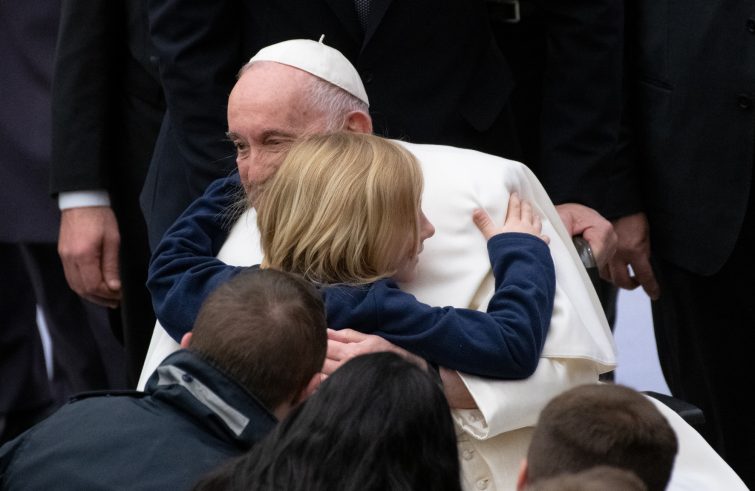
“Evangelizing is not saying, ‘Look, blah, blah, blah’ and nothing more. There is a passion that involves everything, and for this reason we talk about the passion for evangelizing,” the Pope said off-text in his catechesis for today’s general audience in Paul VI Hall, devoted to apostolic zeal. In his concluding remarks, Francis sent out yet a further appeal not to forget “the beloved and tormented Ukraine”, calling on the faithful to pray that “its terrible suffering may soon come to an end.”
“For Jesus there is no going without staying and there is no staying without going”,
Francis explained: “The proclamation is born from the encounter with the Lord; every Christian activity, especially the mission, begins from there. Not from what is learnt in an academy. No, no! It begins from the encounter with the Lord.”
“Only the person who remains with Him can bring the Gospel of Jesus. Someone who does not remain with Him cannot bear the Gospel. He will bring ideas, but not the Gospel”,
Francis remarked: “Equally, however, there is no staying without going. In fact, following Christ is not an inward looking fact: without proclamation, without service, without mission, the relationship with Jesus does not grow.” “Freely you have received, freely give”, are Jesus’ simple words found in chapter 5 of the Gospel of Matthew, which the Pope called upon the faithful to remember and re-read. “The proclamation does not begin from us, but from the beauty of what we have received for free, without merit”, he added: “meeting Jesus, knowing Him, discovering that we are loved and saved. It is such a great gift that we cannot keep it to ourselves, we feel the need to spread it; but in the same style, right? That is, in gratuitousness. In other words: we have a gift, so we are called to make a gift of ourselves; we have received a gift and our vocation is to make a gift of ourselves to others; there is in us the joy of being children of God, it must be shared with our brothers and sisters who do not yet know it! This is the reason for the proclamation. Going forth and bringing the joy of what we have received.”
“God is near.” This is what “must be said, first and foremost”,
the recommendation: “God has always been close to the people. He said it to the people Himself: He said, ‘Look, what God is as close to the nations as I am to you?’”. “This closeness is one of the most important things about God. There are three important things: closeness, mercy, and tenderness”, Francis pointed out: “God is Close, He is Tender and He is Merciful. This is the reality of God.” “We, in preaching, often urge people to do something, and that is fine; but let’s not forget that the main message is that He is near us until the end”, the Pope said. “Accepting God’s love is more difficult because we always want to be in the centre, we want to be protagonists, we are more inclined to do than to let ourselves be moulded, to speak than to listen.” But, “if what we do comes first, we will still be the protagonists. Instead, the proclamation must give primacy to God: to give the primacy to God, the first place to God, and to give to others the opportunity to welcome Him, to realise that He is near.”
God “does not ask us to be able to face the wolves, that is, to be able to argue, to offer counter arguments, and to defend ourselves”,
Francis argued, highlighting the style of Christian witness:
“We might think like this: let us become relevant, numerous, prestigious, and the world will listen to us and respect us
and we will defeat the wolves. No, I send you out as sheep, as lambs. This is important. If you are sheep, rest assured that the Lord will defend you from the wolves. He asks us to be like this, to be meek and with the will to be innocent, to be disposed to sacrifice; this is what the lamb represents: meekness, innocence, dedication, tenderness. And He, the Shepherd, will recognise His lambs and protect them from the wolves. On the other hand, lambs disguised as wolves are unmasked and torn to pieces.” “If I want to be the Lord’s, I have to allow Him to be my shepherd; and He is not the shepherd of wolves, He is the shepherd of lambs, meek, humble, kind as the Lord is”, he added in unscripted remarks referring to the missionary mandate, which “does not just involve the mind. It involves everything, mind, heart, hands, everything, the three languages of the person: the language of thought, the language of affection, and the language of work. One cannot evangelise only with the mind.”
“The Lord makes you lighten your load”,
the Pope remarked highlighting the importance of distancing oneself from material certainties. That is to say: “I am going into the world, not with the style of the world, not with the world’s values. For the Church, falling into worldliness is the worst thing that can happen. I go forth with simplicity. This is how one should proclaim: by showing Jesus rather than talking about Jesus. And finally, by going together, in community: the Lord sends all the disciples, but no one goes alone. The apostolic Church is completely missionary and in the mission it finds its unity.” “So: going forth, meek and good as lambs, without worldliness, and going together”, concluded the Pope. “Here is the key to the proclamation, this is the key to success in evangelization.”










